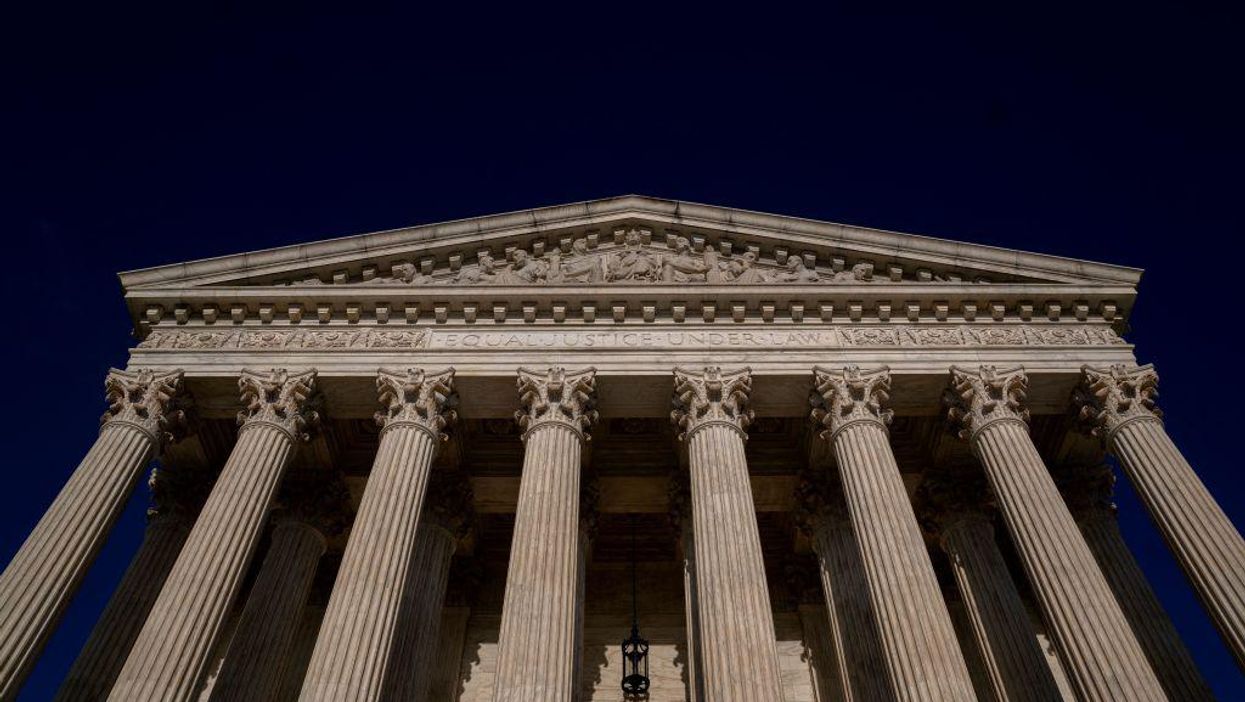
STEFANI REYNOLDS/AFP via Getty Images

The Supreme Court on Monday unanimously ruled in favor of a Christian civic organization that had its application to fly a flag outside of Boston City Hall rejected by city officials on religious grounds.
In a rare 9-0 decision, the court determined that the City of Boston violated Camp Constitution's constitutional rights to free speech by preventing it from flying a flag in the city plaza based solely on the fact that it was a "Christian flag."
At issue in the case, according to the court, was whether or not Boston's flag policy amounted to "government speech." If so, then the city may well be within its rights to prohibit the flying of the flag. However, if not, then its rejection of Camp Constitution's application was wrong.
The court ultimately assessed the latter to be the case.
"We conclude that, on balance, Boston did not make the raising and flying of private groups’ flags a form of government speech," wrote Justice Stephen Breyer in the court's opinion.
"Boston did not make the raising and flying of private groups’ flags a form of government speech. That means, in turn, that Boston’s refusal to let Shurtleff and Camp Constitution raise their flag based on its religious viewpoint 'abridg[ed]' their 'freedom of speech,'" he added.
Additionally, the Court wrote, "Here, Boston concedes that it denied [Harold] Shurtleff’s request solely because the Christian flag he asked to raise 'promot[ed] a specific religion' ... Under our precedents, and in view of our government-speech holding here, that refusal discriminated based on religious viewpoint and violated the Free Speech Clause."
With the ruling, the nation's top court reversed a lower court's decision and remanded the issue back to the First Circuit Court of Appeals.
The rejected application that spurred the case, Shurtleff v. City of Boston, occurred in 2017 when the group's founder Harold Shurtleff sought permission to raise the flag in commemoration of Constitution Day.
The Christian Post previously reported that Boston City Hall Plaza features three massive flagpoles, two of which always fly the American flag and the Massachusetts state flag. The third pole typically flies the city's flag, however, residents are permitted to petition City Hall to raise other flags temporarily and often do.
In fact, between 2005 and 2017, almost 300 different flags were permitted to be flown — including the Turkish flag, the Vatican flag, the Communist Chinese flag, the transgender flag, LGBT flags, and more. Yet Camp Constitution's "Christian flag" was the only one the city ever rejected.
In its denial, the city argued that flying the flag would improperly serve as promotion for a particular religion. Shurtleff and his group sued.
But in February 2020, U.S. District Court Judge Denise Casper ruled against Shurtleff's group, claiming that the city's flagpoles constitute "government speech." When Shurtleff appealed, a three-judge panel on the First Circuit sided with the city, again claiming that it was well within its rights to reject Shurtleff's request.
In addition to Breyer's, three other justices — Brett Kavanaugh, Neil Gorsuch, and Samuel Alito — filed concurring opinion's on the case.
In his concurring opinion, Kavanaugh wrote, "Under the Constitution, a government may not treat religious persons, religious organizations, or religious speech as second-class."
Gorsuch asked, "How did the city get it so wrong?" before tracing the matter back to a preceding case, Lemon v. Kurtzman, which devised what is known as the "Lemon Test," or a one-size-fits-all assessment for resolving Establishment Clause disputes.
"It’s time to let Lemon lie in its grave," asserted Gorsuch.
Alito remarked that while he agrees with the court's ultimate opinion, he rejected the way in which the court analyzed the case regarding "government speech," which he characterized as an often vague and illusory category.
"I cannot go along with the Court’s decision to analyze this case in terms of the triad of factors—history, the public’s perception of who is speaking, and the extent to which the government has exercised control over speech," he said, later adding that "courts must be very careful when a government claims that speech by one or more private speakers is actually government speech. When that occurs, it can be difficult to tell whether the government is using the doctrine 'as a subterfuge for favoring certain private speakers over others based on viewpoint."
"The ultimate question is whether the government is actually expressing its own views or the real speaker is a private party and the government is surreptitiously engaged in the 'regulation of private speech," he continued.
Mat Staver, the Founder and Chairman of Liberty Counsel, the religious liberty law firm that represented Shurtleff, said in a statement, "This case is so much more significant than a flag. Boston openly discriminated against viewpoints it disfavored when it opened the flagpoles to all applicants and then excluded Christian viewpoints. Government cannot censor religious viewpoints under the guise of government speech."